IOS workshop on preparation of Islamic Civilisation Syllabi
September 3, 2018 at at Institute Building, 162, Jogabai, Jamia Nagar, New Delhi

A workshop on the “Preparation of Course of Islamic Civilisation in the light of the writings of Dr. Ismail Raji al-Faruqi” was organised by the Institute of Objective Studies at its conference hall on September 3, 2018. Presided by the IOS chairman Dr. M. Manzoor Alam, the workshop was inaugurated by the Secretary, Islamic Fiqh Academy and the spokesperson of All India Muslim Personal Law Board, Maulana Khalid Saifullah Rahmani. The key-note address was delivered by the vice-chancellor, Maulana Azad University, Jodhpur, Prof. Akhtarul Wasey.
It was decided at the workshop to prepare a course on Islamic civilisation in the light of the works of the eminent Islamic scholar, Dr. Ismail Raji Al-Faruqi. A six-member committee consisting of Dr. Mohammad Fahim Akhtar Nadwi, Maulana Mohammad Umar Abideen Qasim Madni, Prof. Mohsin Usmani Nadwi, Prof. Hamid Nasim Rafiabadi, Maulana Shah Ajmal Farooq Nadwi and Dr. Ashraful Kausar Misbahi was formed for this purpose. While Dr. Mohammad Fahim Akhtar Nadwi was tasked with co-ordinating the activities of the committee, Maulana Shah Ajmal Farooq Nadwi will serve as member-secretary.
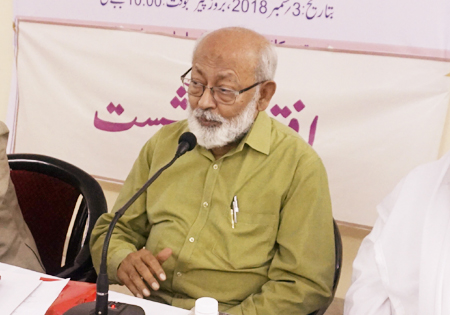
In his presidential address, the IOS chairman Dr. Mohammad Manzoor Alam said that the current phase in the world was marked by ideological war and little- known civilisations were being presented after systematic planning. Citing the case of Judaism, Dr. Alam said that the Jews preserved the Hebrew language and their civilisation. They anxiously waited for the opportune time to arrive and propagated their culture throughout the world. He insisted that media and other sources of information were being used to castigate Islam.
Eighty percent of the content in the media was against Islam. Big powers of the world were united against Islam, and it was high time to ponder over it and counter them with irrefutable arguments. He said that when something was presented in tune with the true spirit of Islam, people would become eager to know more about it. Giving the illustration of Turkey, he noted that the President Recep Tayyip Erdogan fast-tracked his country on development within the parameters of good governance and Islamic values. He expressed the confidence that on completion, the course would help the new generation understand Islam and rekindle an urge in them to know more about Islamic civilisation. Besides offering resource material, the course would become a part of the syllabus for higher classes. He used the occasion to urge the ulema to learn English language as it would consolidate its position in the world in the years to come. He said that even in the Arab world, more attention was being paid to English than Arabic.
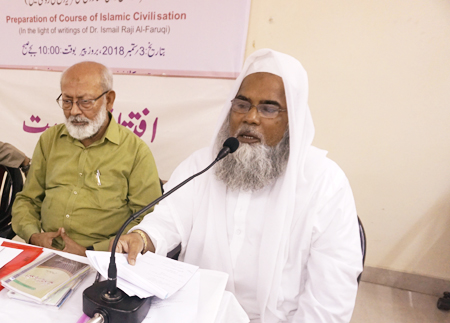
In his inaugural speech, Maulana Khalid Saifullah Rahmani observed that civilisation was rooted in religion, customs and geographical conditions. He buttressed his point by saying that the utterance of words like “Insha-Allah” and “Masha-Allah” during talk and wearing pants, or any other dress, was part of culture or civilization, and not religion. That was the reason why non-Muslim writers used such expressions in their writings. While in India, wearing of coat and pant by the ulema was not liked, top ulema in the Arab world wore this dress and no fuss was created against this.
In Islam, he said the concept of the supremacy of Allah is of utmost importance. Four other supremacies - the supremacy of humanity, law, religion and world were added later.
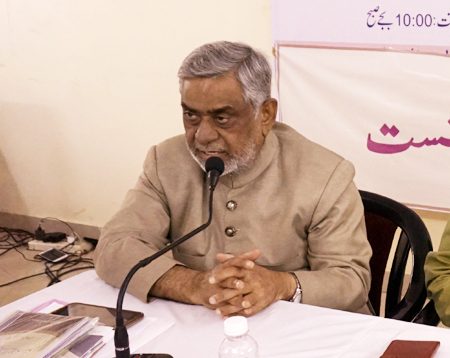
Prof. Akhtarul Wasey, in his keynote address, remarked that the British not only established their suzerainty over us, but also destroyed our educational system, method of medical treatment and our social cohesion. He hailed the decision of our forefathers to concentrate on religion in order to preserve it as wise as the attainment of freedom from foreign yoke. With this purpose in view, a chain of religious seminaries (madrasas) were opened by them. But pursuing the same course after 70 years of Independence was out of tune with the present day realities, he said. We must move ahead and set a syllabus that could focus on both old and new issues, so that it was acceptable to madrasa students and non-Muslims.
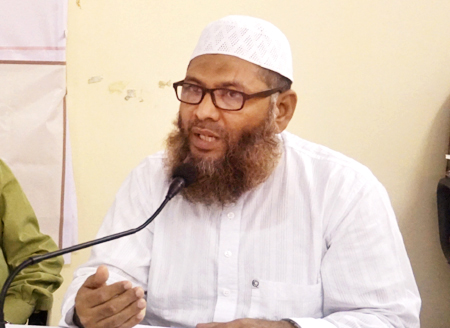
Dr. Mohammad Fahim Akhtar Nadwi briefly explained Dr. Ismail Raji al-Faruqi’s concept of Islamic civilisation and his syncretism approach to religion. Dr. Al-Faruqi favoured the pursuit of knowledge that could also recognise Allah as omnipotent, omniscient and omnipresent. He used to say that acquiring knowledge about God was as important as that about human beings. He was of the view that the Islamic civilisation reigned supreme between 7th and 11th centuries, but it became static during the last 200 years. Dr Akhtar said that the existing system of education was based on Western thought which had no concept of Allah and His Oneness (monotheism).
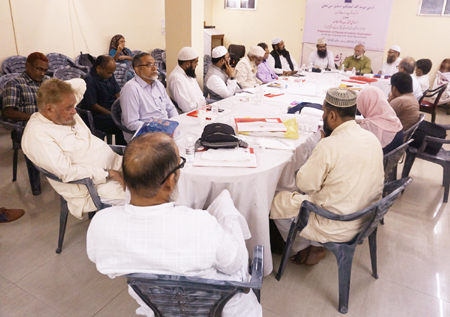
Besides the opening session, the workshop was spread over three other sessions. Those who spoke in different sessions included dean, School of Social Sciences & head, deptt. of Religious Studies, Central University of Kashmir, Srinagar, Prof. Hamid Nasim Rafiabadi, general secretary, All India Muslim Majlis-e-Mushawarat, Maulana Abdul Hameed Nomani, secretary (academic) Jamaat-e-Islami Hind, Dr. Md. Razeeul Islam Nadwi, former dean, School of foreign languages, the EFLU University, Hyderabad, Prof. Mohsin Usmani Nadwi, asstt. prof. of theology, Alia University, Kolkata, Dr. Md. Shamim Akhtar Qasmi, Ustadul Maahidul Ali Al-Islam, Hyderabad, Maulana Umar Abideen Qasim Madni, HOD, deptt. of Islamic Studies, University of Kashmir, Prof. Abdur Rasheed Bhatt, asstt. prof. Islamic Studies, Jamia Hamdard, New Delhi, Dr. Najmus Sahar, ex-head, deptt. of Urdu, L.N. Mithila University, Darbhanga, Prof. Zafar Habib, and research scholar in Islamic Studies, JMI, Dr. Ashraful Kausar Misbahi.
The workshop was preceded by the recitation of a Quranic verse by Hafiz Athar Husain Nadwi, Maulana Shah Ajmal Farooq Nadwi conducted the proceedings and extended a vote of thanks to the participants.
|